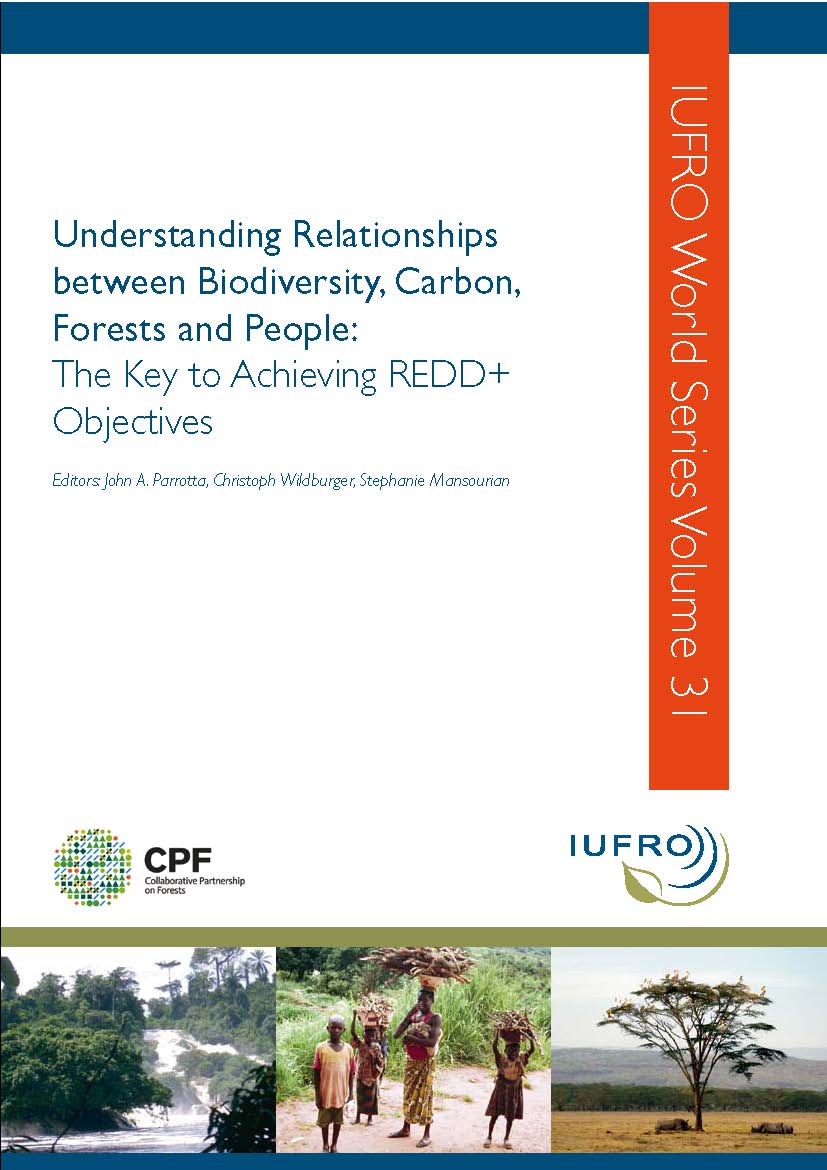 New GFEP assessment report published as IUFRO World Series 31
New GFEP assessment report published as IUFRO World Series 31
Edited by: John A. Parrotta, Christoph Wildburger, Stephanie Mansourian
Forests harbour a major proportion of the world’s terrestrial biodiversity and provide a wide range of vitally important ecosystem services – including carbon sequestration and storage. Deforestation and forest degradation continue to erode biodiversity and the capacity of forest ecosystems to help mitigate climate change and provide the goods and services that sustain livelihoods and human well-being locally, and globally. Reducing greenhouse gas emissions from deforestation and forest degradation, and enhancing forest carbon stocks in developing countries (REDD+) is a proposed mechanism which has the potential to realise its primary objective – climate change mitigation – with variable impacts, positive and negative, on biodiversity, forests and people. REDD+ is complex, its proposed activities and implementation mechanisms not yet clearly defined, and therefore surrounded by uncertainty. Because of its high relevance to climate change mitigation, the conservation and sustainable use of forests and their biological diversity, the Expert Panel on Biodiversity, Forest Management and REDD+ was established by the Collaborative Partnership on Forests in December 2011 to carry out this assessment.
The Expert Panel included 24 scientists and other experts from a variety of biophysical and social science disciplines relevant to the topics covered in this assessment report. An additional 18 contributing authors added their expertise to the assessment. Each chapter was prepared by a team of Lead Authors and Contributing Authors led by one or more Coordinating Lead Authors. A full draft of the report and its individual chapters was peer-reviewed prior to its completion. The results of this voluntary collaboration between January and October 2012 are presented in the six inter-related chapters comprising this book.
This assessment report evaluates the implications of forest and land management interventions envisaged under REDD+ in a multidimensional and integrated fashion. It summarises the most current scientific literature that sheds light on the relationships between forest biodiversity and carbon (and other ecosystem services), how these complex relationships may be affected by management activities implemented to achieve REDD+ objectives, the potential synergies and tradeoffs between and among environmental and socio-economic objectives, and their relationship to governance issues. Based on the main findings of the assessment (summarised in Chapter 6), a policy brief entitled ‘REDD+, Biodiversity and People: Opportunities and Risks’ has been prepared especially for policy- and decision-makers.
The full report is formally presented at Forest Day 6 on 2 December during the United Nations Framework Convention on Climate Change (UNFCCC) meeting in Doha, Qatar (26 November-7 December, 2012).
The report, the policy brief and a press release – New Study Suggests Global Pacts Like REDD Ignore Primary Causes of Destruction of Forests – are available for download.
Report and Policy Brief: http://www.iufro.org/science/gfep/biodiv-forman-redd-panel/report/
Press Release: http://www.iufro.org/science/gfep/media-information/gfep-bfmr-assessment-press-release/
For more information about the Expert Panel on Biodiversity, Forest Management and REDD+, please visit:
http://www.iufro.org/science/gfep/biodiv-forman-redd-panel/

Leave a Reply